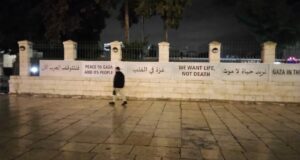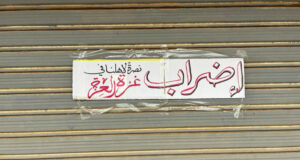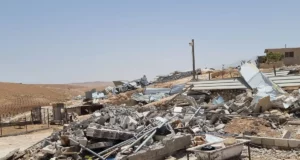By Peggy Gish
CPT Hebron
“A donkey was stolen by an Israeli settler from the Karmel settlement, and we saw it inside the settlement compound. Please come with us to photograph it for evidence when we make our complaint.” two Palestinians asked the CPT and Operation Dove team in the South Hebron Hills village of At-Tuwani.
Two days after an Israeli soldier and a settler told a Palestinian family they were not allowed to use their land either for their sheep or for raising vegetable crops, team members watched nearby while three Palestinian children continued to let their flocks graze.
Another day, the team videotaped Israeli settlers combining and hauling away wheat planted by a Palestinian family on their land, while Israeli soldiers watched and did nothing to stop them.
By mid-June, an unofficial tally counted at least 57 adult and 46 young sheep and goats from the villages of At-Tuwani and Mufakara have died from poison Israeli settlers spread on Palestinian grazing land in March and April of 2005.
As I leave the West Bank tomorrow to return to work with the CPT team in Iraq, I can’t help but think of the differences and similarities between life under occupation in both places. In Iraq there is an inadequate supply of medical equipment and medicines, while in the West Bank, the people are blocked when they try to reach clinics or hospitals. In the West Bank the water is allocated in an unfair proportion favoring Israeli Jews. In Iraq, the available water is mostly impure. In Iraq there isn’t the overt confiscating of the homes and land, but their economy is hurt by U.S. economic policies that allow for systematic takeover of natural resources and exploitation by international corporations.
Palestinian families in At-Tuwani tell us, “Yes, we have our problems but the problems in Iraq are much greater.” In turn, Iraqis tell me, “The Palestinian occupation is the ‘mother of all problems,’ and needs to be resolved in order to have peace in the whole region.” I am impressed by the ability of the Iraqi and Palestinian people and many other compassionate people around the world to look beyond their own troubles and be able to care for the sufferings of others. In both places, we are encouraged by organizations and individuals who take significant personal risks to work non-violently.
 International Solidarity Movement Nonviolence. Justice. Freedom.
International Solidarity Movement Nonviolence. Justice. Freedom.


